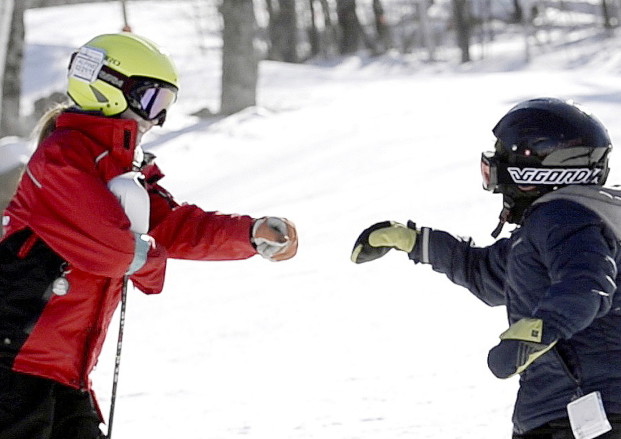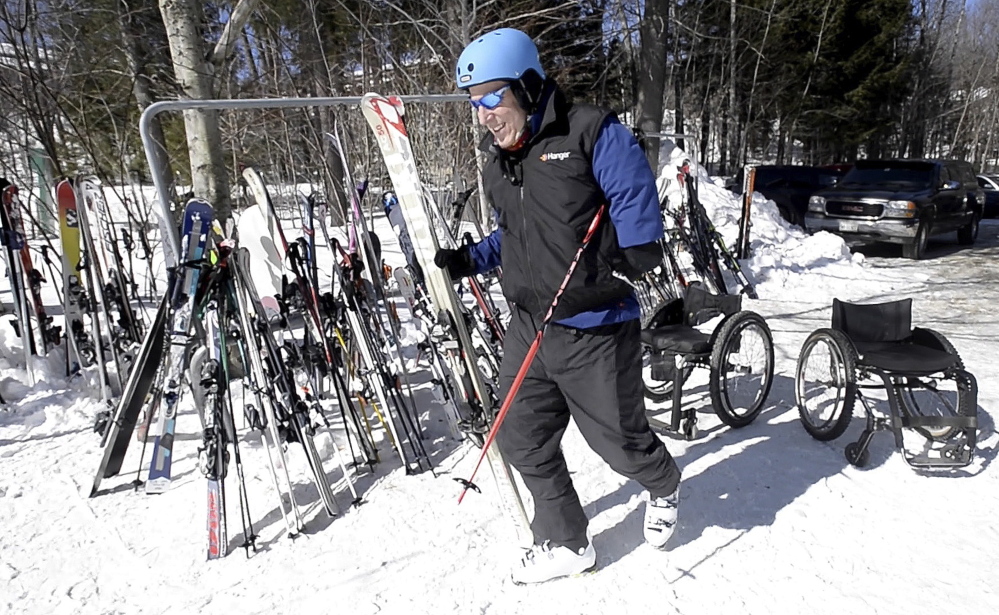Keegan Moreau and her friend Lizzie Ridder are heading for a possible fall. They can’t wait.
On a picture-perfect winter day, Keegan, 16, and Lizzie, 19, make their way to a chairlift at Sunday River in Newry, their skis expertly slicing through the snow. The right sleeves of their parkas – Keegan is wearing bright red, Lizzie metallic gray – are folded up and wrapped with duct tape to hold them in place.
“I was born without my right arm below my elbow,” says Keegan, a sophomore at Edward Little High School in Auburn. “The doctors think it was a blood clot, which stopped the growth of it.”
Lizzie, who is from St. Louis, Missouri, is also missing a hand and part of her arm.
But that hasn’t stopped either of them from planning to attack the more challenging trails during the three days they’ll spend at Camp No Limits’ winter session. Camp No Limits is the only camp in the country for young people with limb loss and their families.
When Keegan arrived for the first time 10 years ago, she was so shy and embarrassed about her arm that she hid behind her mother’s coat. That didn’t last long.
“It’s really cool to be able to go to a place where you don’t have to explain (your disability),” Keegan says. “I saw other amputees like me, other people missing their arms, and how confident they were in themselves. So I got more confident in myself.”
Today, Keegan mentors younger campers.
“It’s awesome to see how confident she is now,” says her mother, Missy Moreau. “She’s taking what other people gave to her when she was so small and giving it back.”
That’s the gift of Camp No Limits.
The program was founded 11 years ago by Mary Leighton, an occupational therapist.
In 2003, Leighton, 38, was working in a pediatric practice in Maine. One of her patients was a 3-year-old boy who was missing all four limbs.
“(We) didn’t really know what we were going to do with him,” Leighton says, “but quickly he showed us he was really able to do anything. He was up and down the stairs, building blocks, doing all those things.”
Leighton started working with other children with limb loss and realized it might be good for them to get to know one another. She also realized that there were few resources available for their families in terms of education, networking and support.
So she decided to start a camp.
“Yeah, I was young,” she says with a laugh.
There are now 10 Camp No Limits programs nationwide. Maine is the only state with both summer and winter sports programs. The winter program is done in conjunction with Maine Adaptive Sports & Recreation.
The first year, four families attended Camp No Limits at Pine Tree Camp on the shores of North Pond in the Belgrade Lakes.
Today, about 70 young people with limb loss – along with their parents, siblings, grandparents, aunts and uncles – arrive each summer for the five-day Camp No Limits program in Maine.
Mornings are usually spent working on life skills: how to put your hair in a ponytail, tie a shoe, button a shirt, ride a bike.
“We have physical therapists and occupational therapists and prosthetists there,” Leighton says, “and (we) work on … some of those life skills we kind of all take for granted.”
In the afternoon there’s the fun stuff: swimming, kayaking, rock climbing, guitar lessons, cooking classes. In the winter session, skiing and snowboarding.
“Anything is possible as long as we can figure out a way,” Leighton says.
Family members are able to attend support groups where they share stories and advice.
That’s one of the things that Xavier Botana, the father of 12-year-old David, who’s been a camper for six years, appreciates the most.
“It gives people an opportunity to meet other parents that are facing the same kinds of challenges,” Botana says. “There’s a lot of tips around how do you do school, how do you do bullying?”
Mike Benning, 50, a gold medalist in the national handicapped skiing championships, is one of the adult volunteer mentors. Benning lost his arm to cancer when he was 14.
“Activities like this were so, so important for my rehabilitation,” he says. “To be around other amputees was so grounding for me. Amputees speak the same language, and to be able to speak that language in a safe environment is what this is all about.”
It’s also about being in a world where you’re no longer the one who’s different.
“When they come to camp,” Leighton says, “they meet, possibly for the first time, people who are like them. They learn they’re not alone. They learn to be comfortable in their own skin. That’s pretty powerful.”
Send questions/comments to the editors.




Comments are no longer available on this story